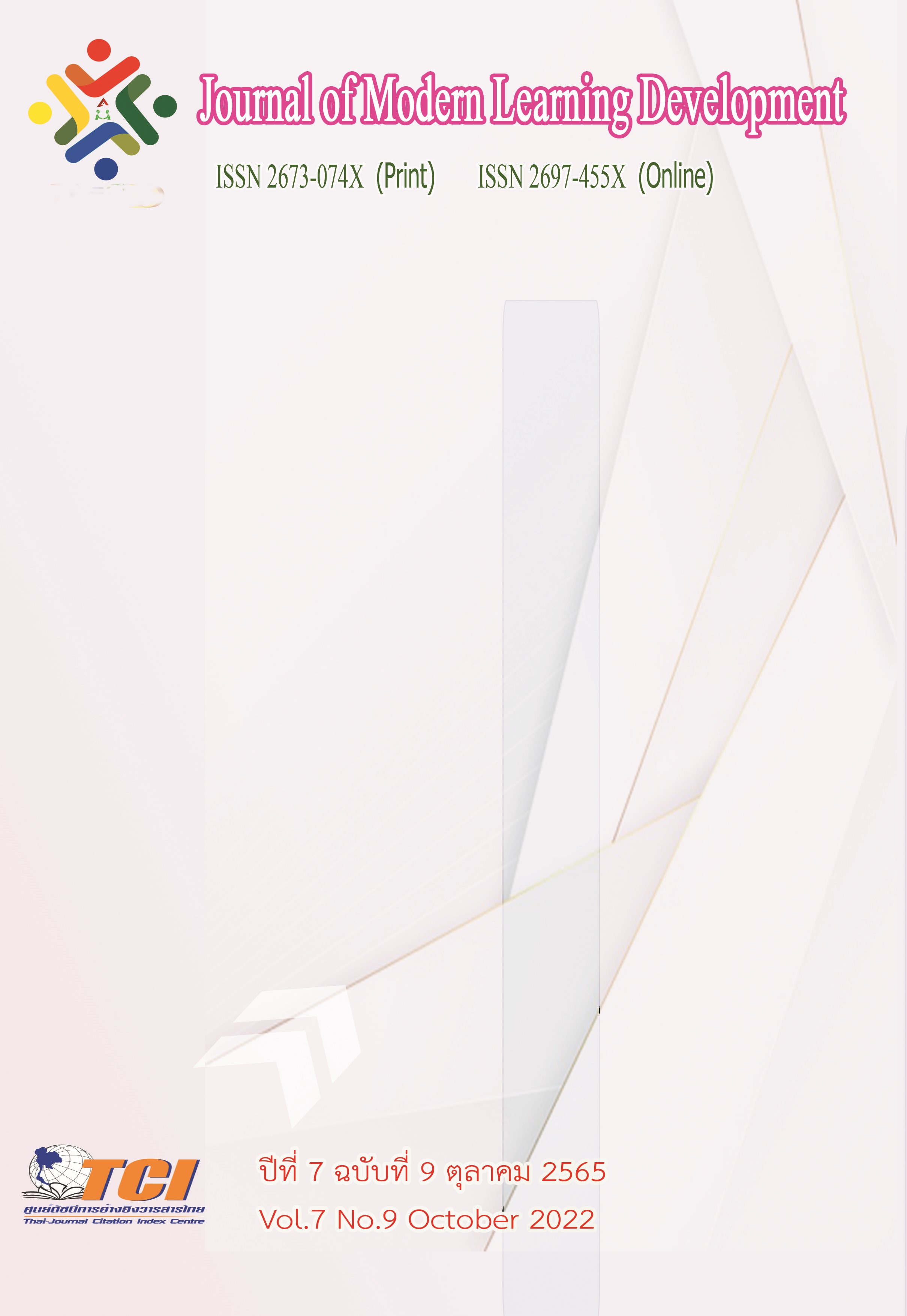Factors Affecting the Effectiveness Learning through E-Learning System of Undergraduate Students of University in Pathum Thani Province
Main Article Content
Abstract
The purpose of this research is to study personal characteristics factor that affect learning effectiveness through E-Learning system of undergraduate students. As well as study environment factor that affect learning effectiveness through E-Learning system of undergraduate students. Data were collected by using questionnaires on the sample who are studying at bachelor's degree of one university in Pathum Thani province for Stratified Random Sampling of 400 subjects. Data were analyzed using descriptive statistics were frequency, percentage, mean and standard deviation. And inferential analysis were t-test, one-way analysis of variance (ANOVA), and Multiple Linear Regression with All Enter method. The results of the research were as follows. Most of the respondents were female, studying at the second year of logistic major. The research result found that personal characteristics factor affect learning effectiveness through E-Learning system was significantly at the statistical level of .05, which matched the assumptions that have been set. The different level of education had effects in terms of skills, and different majors had effects in terms of knowledge. More over the result found that study environment factor can approximately explain learning effectiveness variance at about 61.10% (Adjust R2 = 0.611). Wherewith study environment factor in terms of family and classmate supporting had the greatest effect on learning effectiveness (β = 0.211, t = 5.690), and learning environment factors in the classroom atmosphere had secondary effect on learning effectiveness (β=0.283, t = 4.117) with significantly at the statistical level of .05
Article Details
References
กระทรวงการอุดมศึกษา วิทยาศาสตร์ วิจัยและนวัตกรรม. (2562). หลักเกณฑ์ วิธีการ และเงื่อนไขการจัดการศึกษาผ่านระบบเทคโนโลยีสารสนเทศ, นโยบายและยุทธศาสตร์การอุดมศึกษา วิทยาศาสตร์ วิจัยและนวัตกรรม พ.ศ. 2563 – 2570. สำนักงานสภานโยบายการอุดมศึกษา วิทยาศาสตร์ วิจัยและนวัตกรรมแห่งชาติ และ สำนักงานคณะกรรมการส่งเสริมวิทยาศาสตร์ วิจัยและนวัตกรรม.
กระทรวงการอุดมศึกษา วิทยาศาสตร์ วิจัยและนวัตกรรม. (2563). มาตรการและการเฝ้าระวังการระบาดของโรคติดเชื้อไวรัสโคโรนา 2019 (COVID- 19) (ฉบับที่ 11). ออนไลน์. สืบค้นวันที่ 9 พฤษภาคม 2565. แหล่งที่มา: https://www.mhesi.go.th/images/Pusit2021/pdfs/CCF_000006.pdf.
กฤตพร สินชัย และ องอาจ เจ๊ะยะหลี (2563). การจัดการเรียนการสอนออนไลน์ภายใต้การเปลี่ยนแปลงในศตวรรษที่ 21. วารสารวิชาการมหาวิทยาลัยราชภัฏภูเก็ต. 16 (2), 1-18.
ดวงใจชนก พรรษา และคณะ. (2565). ความคิดเห็นของนักศึกษาต่อการเรียนในชั้นเรียนปกติและการเรียนออนไลน์แบบกะทันหันในช่วงการแพร่ระบาดของ COVID-19. ภาษาปริทัศน์. 37, 1-8.
นิธินาถ แซ่ตั้ง และคณะ. (2564). การวิเคราะห์และออกแบบการจัดการเรียนรู้แบบผสมผสานภายใต้สถานการณ์การแพร่ระบาดของเชื้อไวรัส COVID-19, The Seventeenth National Conference on Computing and Information Technology:.
สำนักงานจังหวัดปทุมธานี. (2565). ข้อมูลสถาบันการศึกษาระดับอุดมศึกษาในจังหวัดปทุมธานี. ออนไลน์. สืบค้นวันที่ 9 พฤษภาคม 2565. แหล่งที่มา: http://www.pathumthani.go.th/new_web/ Edo1/a-a1.htm.
สำนักงานปลัดกระทรวงการอุดมศึกษา วิทยาศาสตร์ วิจัยและนวัตกรรม. (2565). ข้อมูลสถิติจำนวนนักศึกษาปัจจุบัน จำแนกตามกลุ่มสถาบัน ชื่อสถาบัน ชื่อคณะ ชื่อสาขาวิชา ระดับการศึกษา. ออนไลน์. สืบค้นวันที่ 9 พฤษภาคม 2565. แหล่งที่มา: https://data.mhesi.go.th/dataset/univ_std_ 12_01/ resource/a5d6f9cf-b809-4ebc-93b2-f09751010b3a
สิริพร อินทสนธ. (2563). โควิด - 19 : กับการเรียนการสอนออนไลน์ กรณีศึกษารายวิชาการเขียนโปรแกรมเว็บ. วารสารวิทยาการจัดการปริทัศน์. 22 (2), 203-214.
อรณิชา เสตะคุณ. (2560). ปัจจัยที่มีผลต่อประสิทธิผลของการเรียนรู้ผ่านระบบอิเล็กทรอนิกส์. ออนไลน์. สืบค้นวันที่ 9 พฤษภาคม 2565. แหล่งที่มา: file:///C:/Users/Administrator.05Q7S5 NVLUWLKHM/Downloads.
Keskin, S., Yurdugül, H. (2022). E-learning experience: Modeling students’ e-learning interactions using log data. Online. Retrieved May 17, 2022, from https://files.eric.ed.gov/fulltext/EJ1330617.pdf
Mohamed A. G., Haruni M., Chang Z. and Koen D. (2020, August). “Reflection on elearning system of the Mzumbe University in Tanzania: Successes, challenges and way forward”, International Journal of Education and Development using Information and Communication Technology (IJEDICT). 16 (2), 109-121.
Wood, D., Bruner, J., and Ross, G. (1976). “The Role of Tutoring in Problem Solving”, Journal of Child Psychology and Psychiatry. 19 (2), 90.
Yamane, T. (1973). Statistics: An Introductory Analysis. 3rd Ed. New York: Harper and Row Publications.


